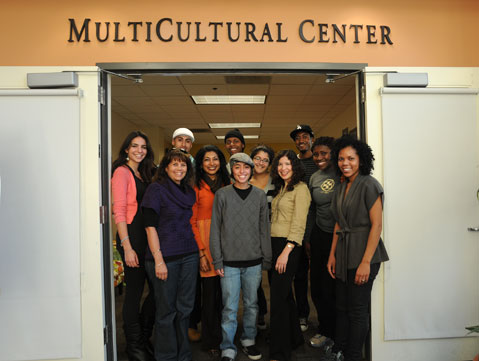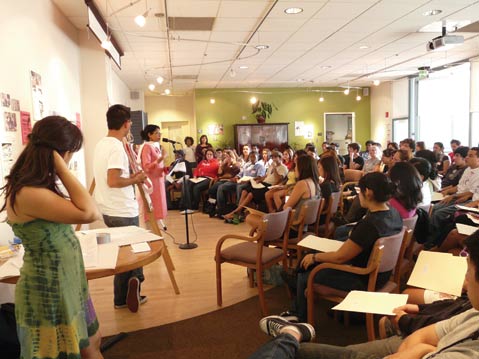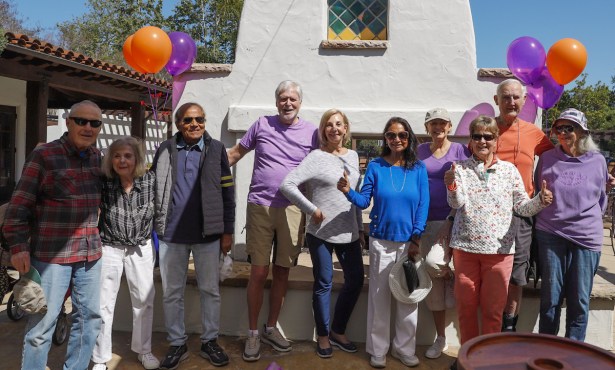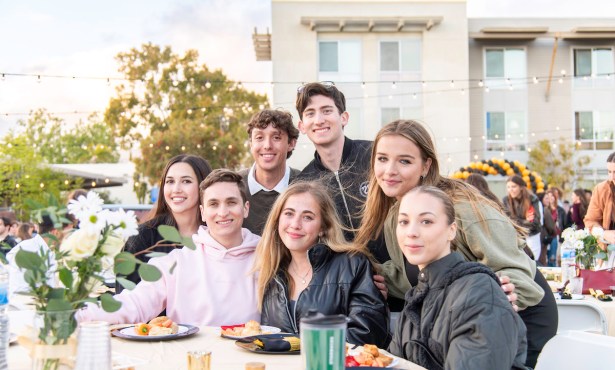UCSB’s MultiCultural Center Celebrates 20 Years
Vice Chancellor Credits MCC with Sea Change in Race Relations

On the evening of November 4, 2008, a group of UCSB students gathered in a spacious lounge on campus to watch the presidential election results. They sat together as Barack Obama’s victory was announced, and listened as the country’s first African-American president-elect spoke to the nation about the power of hope and the possibility of change.
From that room in the University Center, the students could see Storke Plaza, where performances, celebrations, rallies, and protests have been staged for decades. It was, in fact, a series of protests that took place there more than 20 years ago that galvanized a student-led campaign for the creation of UCSB’s first MultiCultural Center (MCC).
Zaveeni Khan-Marcus has been at the helm of the MCC since 1988, the year the center opened in response to a student outcry against the oppression of minority groups and their call for a safe haven for students of all cultures.
“In the 1980s, there was a climate of intolerance toward people of color-especially African American, Chicano, American Indian, and Asian-American students,” Sri Lanka-born Khan-Marcus said recently. “There was tension building up around campus.” That tension came to a head when, in March 1984, the Associated Students sponsored a performance art event at Campbell Hall that drew an audience of 900. Among the acts was a group of white fraternity boys who darkened their faces with black grease paint, donned Afro-style wigs, and impersonated the music group Otis Day and the Knights.
The backlash was fierce. Protests ensued, and a group of students drafted a letter to then-Chancellor Robert Huttenback outlining their concerns and demanding the creation of a university cultural center. The furor drew the attention of a number of media outlets. Faced with a public relations crisis and a student body in upheaval, the administration responded by forming a committee to investigate allegations of racism. A few years later, the university granted the students “one small room and a desk,” Khan-Marcus recalled. “They said, ‘Here is your multicultural center.’ There was no staff, no funding.”
The original MCC was located in the wooden barracks behind Storke Tower. The room was cramped, Khan-Marcus remembers, but it was a space nonetheless. They had to push their desks to the sides of the room and unplug the phone in order to hold an open-mike night or host an ethnic music performance, but students kept coming through the door.
“Our mission was two-fold,” Khan-Marcus explained. “We wanted to create a safe space and a sense of belonging for students of color, and we wanted to educate people about social justice, racial equality, stereotypes-all the things that affect marginalized communities.”

Two Decades Later
This month, the MCC celebrates 20 years of fulfilling its mission, one that has grown to include support for international students as well as the gay, lesbian, bisexual, and transgender community. When Khan-Marcus talked about the center, she crept to the edge of her chair, smoothing her red-and-yellow sari over her legs. Her eyes lit up from within as she talked about the early ’90s, when the university was planning an expansion of the UCen. “They went to the students and asked for the fees a couple of times, and the bill failed,” she said, a smile pulling at the corner of her mouth. “With the MultiCultural Center added, the bill passed.”
Today, the MCC occupies a 4,500-square-foot, purpose-built space in the UCen, including a theater and lounge, meeting rooms and offices, and a fully equipped kitchen. In addition to a full calendar of performances, lectures, and discussions, the MCC shares programming with many academic departments, and acts as home to about 80 culturally affiliated student groups. Students occupy its rooms from 8 a.m. until 10 p.m. most days of the week. “The character of these rooms changes by the hour,” Khan-Marcus said. “You might have a Filipino student group meeting in the morning, followed by a hip-hop dance class, and then taco hour.” According to Roman Baratiak, associate director for Arts & Lectures and a longtime member of the MCC’s board, it’s the center’s casual, inclusive atmosphere that is its greatest strength. “Because it’s such an open, welcoming space, the relationships they have established with students are extremely personal,” Baratiak noted. “It’s really a community space.”
KCSB Student Adviser Elizabeth Robinson, who has been involved with the MCC since its early years, believes the center has been able to encourage open dialogue between cultures, especially in times of crisis. “The day the Rodney King verdict was announced, there was a great deal of tension on campus,” Robinson remembered. “On the spur of the moment, we organized a place for Asian-American and African-American students in particular to come together to talk.” Robinson also cited September 11, 2001, and the days following as a time when the MCC welcomed open dialogue and sharing.
To Michael Young, UCSB’s Vice Chancellor for Student Affairs, the MCC and organizations like it have played a crucial role in changing race relations in America during the past two decades. “When I think back to the election of Barack Obama and the change that has been brought about in this country in a relatively short period of time,” he said, “I think the MCC and centers like it around the country were instrumental in helping generations of young people overcome racial, cultural, and sexual prejudice. Students were right. They began to break down those barriers in the way they engaged each other, and the MCC provided a framework and a forum and a safe space for them to do that.”
What many Santa Barbarans may not know is that the MCC’s programs are open to the public, and most of them are free. Anyone can attend its weekly programs, like the Cup of Culture movie series, and its special events, which range from Balinese dance performances to conversations with well-known hip-hop artists.
Third-year Asian-American Studies student and MCC staffer Justin Reyes praised the center for its inclusion of the larger community, and said his time at the MCC has in turn taught him about the world outside the university. “It’s really been a place where I have come in contact with the world, with political and social issues I might not have otherwise considered.”
That’s exactly the kind of effect Khan-Marcus hopes the MCC will have on all who pass through its doors, and, like Young, she sees signs that the university and world beyond it are entering an era of greater cultural understanding. At the same time, she’s keenly aware that the issues the center was founded to tackle are still relevant. “Last week, we had a discussion called Race Matters: Does It Matter?,” she said. “The conclusion was that the issue of racism will not go away just because we have a black president. There is still work to be done.”
Twenty years after its formation, the MCC is continuing to provide support and to give voice to the university’s many cultural groups, and to challenge the community to be ever more embracing of cultural differences. As Young sees it, that’s something to celebrate. “The MCC, the work it does, and what this generation of young people have driven us to,” he said, “it does give you hope.”
4•1•1
The MCC celebrates its 20th anniversary with a performance by hip-hop/reggae/soul/spoken word artist Nadirah X on Friday, February 27. On Saturday, February 28, at 2 p.m., there will be a panel discussion on the events that led to the creation of the MCC. To learn more, call 893-8411 or visit mcc.sa.ucsb.edu.



